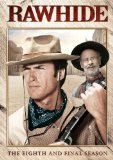| Reviews & Columns |
|
Reviews DVD TV on DVD Blu-ray 4K UHD International DVDs In Theaters Reviews by Studio Video Games Features Collector Series DVDs Easter Egg Database Interviews DVD Talk Radio Feature Articles Columns Anime Talk DVD Savant Horror DVDs The M.O.D. Squad Art House HD Talk Silent DVD
|
DVD Talk Forum |
|
|
| Resources |
|
DVD Price Search Customer Service #'s RCE Info Links |
|
Columns
|
|
|
Rawhide: The Eighth and Final Season
One final--and at this late stage of the game a typically confused--round-up for Clint and them there dogies. CBS DVD and Paramount have released Rawhide: The Eighth and Final Season, a 4-disc, 13-episode collection of the once-mighty CBS Western's aborted 1965-1966 season. With lead star Eric Fleming shown the door during the summer hiatus, Clint Eastwood's Rowdy Yates takes the reins as the new trail boss, much to the consternation not of cattle rustlers or psychotic outlaws or backward hill folk...but of CBS Chairman William Paley, who took one look at one of his favorite shows on his network, saw laconic, bored Eastwood dogging it, and summarily cancelled the oater outright. New faces ping-ponging back and forth in episodes that were jumbled up from their production order to air date further distanced the dwindling number of fans who bother to tune in to Rawhide at this point, which only reinforced Paley's decision. Too bad, too...because quite a few of these episodes still highly rate. No extras, of course, for these sharp fullscreen black and white transfers.
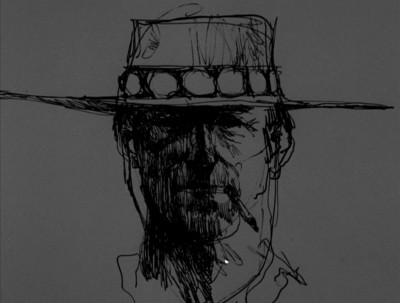
North Texas, a few years after the War Between the States. Former "ramrod" and now trail boss Rowdy Yates (Clint Eastwood) has 3,000 head of cattle to get to Sedalia, Missouri, and he hasn't got time to screw around with drovers who can't cut it out on the newer Chisum trail. Tough veteran rough rider Jim Quince (Steve Raines) is now the run's new ramrod, and always grumbling, comical G.W. Wishbone (Paul Brinegar) is still the chuck wagon cook. Newcomers on the run include rider and former buffalo soldier Simon Blake (Raymond St. Jacques), rider and Englishman Ian Cabot (David Watson), and scout Jed Colby (John Ireland). Fighting the elements every step of their journey, including bad grassland, storms, mountainous passages and killing heat and drought, Rowdy's team encounter obstacles not just from nature, but from the human landscape, as well, as they deal with the problems of the people they encounter out on the trail.
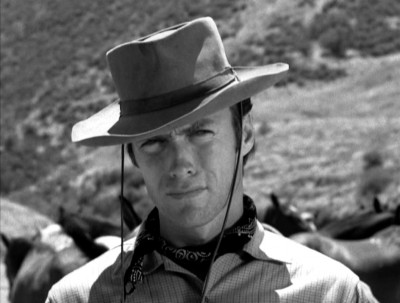
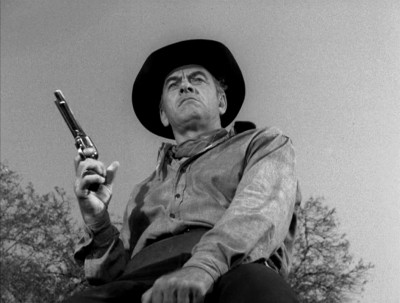
In my season seven review of Rawhide, I pointed out how a bold production move towards deliberately "arty" episodes from producers/writers/director Bernard L. Kowalski and Bruce Geller, in an effort to stem Rawhide's slipping Nielsen numbers, resulted in some remarkable outings...but no better ratings for the rapidly failing oater. For this abbreviated eighth season, many of the episodes are quite good (although not in the K-G category), but the common thread that binds them together seems to be a vibe of half-hearted, last-ditch doctoring of a terminally ill patient. Remaining fans that tuned into Rawhide that fall of 1965 found the series' lead character, trail boss Gill Favor, mysteriously M.I.A., with no explanation ever forthcoming (by most accounts, the sometimes difficult Eric Fleming was finally canned by the producers). Off-and-on again semi-regulars Pete Nolan (Sheb Wooley) and Hey Soos Patines (Robert Cabal) were "off" for good, as was dopey supporting player Mushy, played by James Murdock. Perhaps most disheartening of all is the marginalization of Paul Brinegar's Wishbone character this season--the talented, amusing supporting player doesn't even get his own episode this time around. Even though Rawhide was set up as a flexible anthology format, the series' framework was held together by the relatively stable "family" of characters that most viewers wanted to see week after week in their homes. Taking away supporting characters that either had come and gone before, or who didn't contribute much to the show in the first place, wouldn't cause that much damage to the show's sense of continuity. But ditching the lead performer without even a passing mention had to have thrown the remaining viewers who stayed faithful to the series.
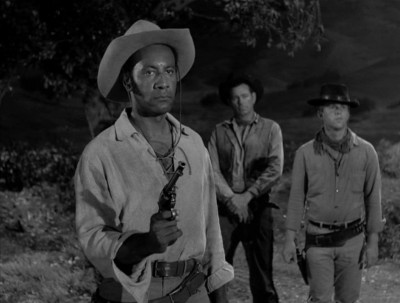
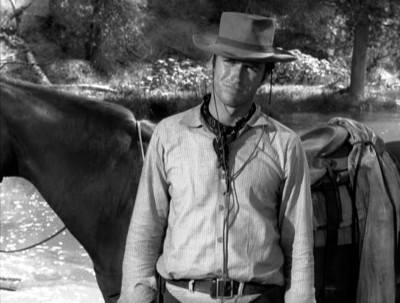
In the same vein, the producers compound that lost sense of viewer continuity this season by introducing new characters without the slightest bit of background information on them, before they're jumbled up--on-screen one week and gone the next...only to return the following week--due to some rather illogical production date/air date shuffling. In the season opener, Encounter at Boot Hill, newcomers Raymond St. Jacques, as rider Simon Blake, and David Watson as rider Ian Cabot, appear quite chummy with steely Rowdy Yates, but we're never told how they joined the run, what their pecking order is (Blake seems to occupy some senior position...but what?), or most critically: who are they? I would imagine most people know that there were all kinds of people, of different nationalities and races, who worked as "cowboys" during the settling of the West. So the possibilities of working in new stories or at the very least new viewpoints within Rawhide's more established storylines, would seem high with the addition of Englishman Cabot and African-American Blake. However, absolutely nothing cultural or racial or anything for that matter is explored in either character--the wonderfully talented St. Jacques in particular is given nothing to do in these 13 episodes). It's a decision that makes it very hard not to think that the producers and CBS were just plugging in a token Black actor and a Britisher to superficially ride the wave of two currents then occupying the American scene: the exploding civil rights movement, and the "British invasion" of our music and movies.
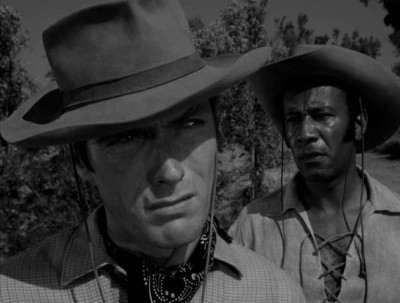
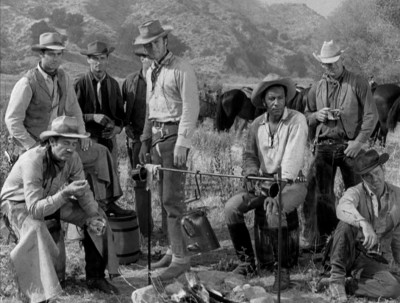
So who was oddly, incoherently alternating with St. Jacques and Watson on those off-weeks? Big-time movie star John Ireland (one of my favorites), as scout Jed Colby. And guess what...except for one storyline where we get a line or two about one of his past adventures, we never learn a thing about him, either. How he got on the ride, or more importantly, who, exactly, he is, isn't told to us. And of course to confuse the audience more, sometimes St. Jacques shows up on those Ireland episodes, sometimes Watson...or neither one. As for the show's "new" anchor, Eastwood, well...it's tough to get audiences to tune in week after week when the star of the show looks alternately pissed-off or bored out of his skull. Far from feeling finally ready to shine in the part (now that Fleming's sarcastic, frequently demeaning-to-Rowdy trail boss is gone), Eastwood has made it clear in countless subsequent interviews that by this time in his stint on Rawhide, he was more than ready to depart the series. And frankly, it shows. Had either Rawhide somehow magically managed to stick around another two years, or had A Fistful of Dollars--a huge hit in Italy at this point but still not known in the States in 1965--somehow managed to be released this season, maybe audiences would have flocked to Eastwood's surly, mean take on his once-dopey Rowdy character. As it worked out, though, Eastwood looks like an actor who knows his steady acting gig is soon to end--a gig he never really liked, anyway--while irritably waiting to see if a no-budget no-name Italian spaghetti Western would translate into a high-profile movie career. With all this confusion over vague, fuzzy new characters, and a lead who doesn't seem particularly thrilled in his new promotion...no wonder the left-over long-term viewers further abandoned Rawhide, while newcomers couldn't find a foothold amid the chaotically shifting cast.
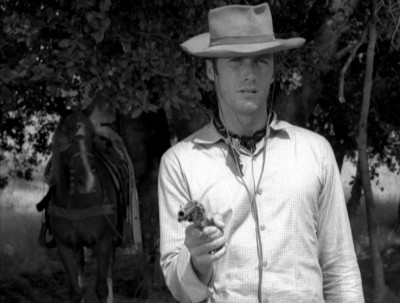
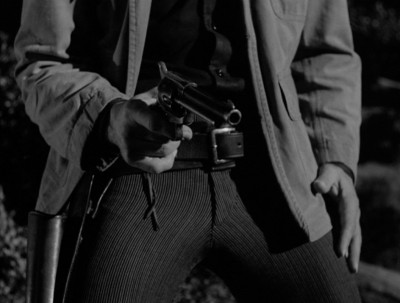
The season opener, Encounter at Boot Hill, certainly seems designed to grab whomever might be tuning in, with now-legendary TV director Sutton Roley delivering his patented dynamic, electrifying set-ups and cuts for this otherwise familiar story from Anthony Spinner about a crooked sheriff (Simon Oakland) taking over a town. Solid turns from pros Oakland and Jeff Corey (doing his usual obsessed psychotic) help, with Timothy Carey getting big, big laughs with his own crazy shtick (I hit the floor when, pitching pennies, he yells out, "There's my mother and her hominy grits!" I guarantee he ad-libed that...), but Roley's hyperventilating style trumps substance in this finally superficial outing. Herman Miller's Ride a Crooked Mile, about John Ireland's obsession with getting a fine horse from crook John Drew Barrymore, would have had more impact if we actually had some kind of introduction to Ireland's character--why do we care what he wants, when we don't know who he is, or why he "is" (negative or dismissive notes are all I've ever read about John Drew Barrymore's acting chops, but this is another TV turn of his where he impressed me with his fidgety, snake-charming skills). Apparently somebody decided early it wasn't working out with Watson, because he's relegated to the end credits here in Six Weeks to Bent Fork, from Mort R. Lewis, where Rowdy has to suffer under hardass James Gregory's leadership when Rowdy's injured during the run. Too many familiar elements from previous Rawhide episodes lessens the impact (starving Indians, crooked townspeople looking to rip-off the drovers), while it's easy to see why Watson wasn't connecting with the production (his British witticisms and dropped-in phrases come off as arbitrary and inorganic--he's hardly "period"...and what the hell is with that embarrassing finale, where all the men start whistling The British Grenadiers? That's "the olde West"?). At least L.Q. Jones is amusing in a small part--they should have hired him onto the cast.
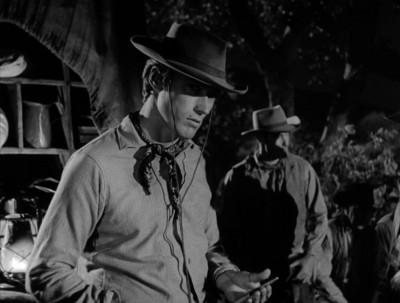
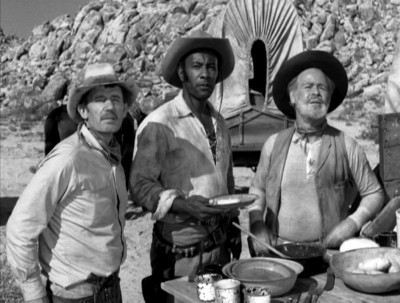
Far, far superior is scripters Joanna Thompson's and Jerry Adelman's Walk into Terror, a punchy Wages of Fear/Ace in the Hole hybrid that finds the unlikely Of Mice and Men duo of Bruce Dern and Claude Akins helping the men transport some old nitro to a collapsed mining cave where Quince and Blake are trapped (cave-in episodes, no matter what the series, always work). Director Thomas Carr develops an increasingly suspenseful rhythm, while Bruce Dern, naturally, walks away with the episode (the second he's on, you know he's operating on another level: instantly alive and irritating as hell). One of the season's best. Scripter Walter Black's Escort to Doom's story about starving Cherikowa Indians led by White chief Rip Torn stays pretty interesting until its contrived end (of course he comes in on the side of the Whites). Torn's pretty intense, and does well with the sometimes silly role. Scripter Black is back for Hostage for Hanging, another intriguing, entertaining entry that sports a familiar-but-well executed story...that unfortunately pulls up lame at the finish: a crazy bunch of backwoods folk take Rowdy hostage over a scam horse deal gone bad. Excellent, quirky turns from good actors Sharon Farrell, Robert Blake, and Warren Oates, are memorable here...but Mercedes McCambridge should have had a getaway car at the ready for her grotesquely miscued performance.
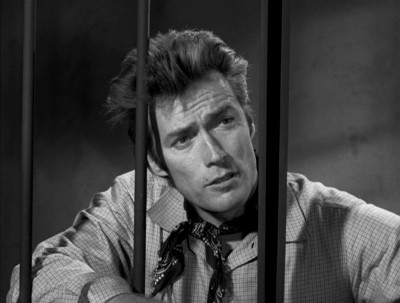
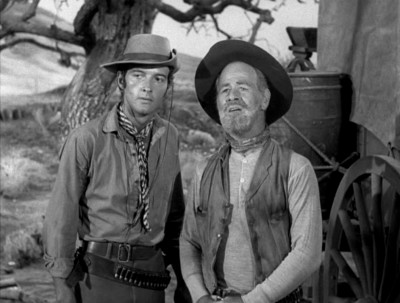
Boris Ingster and Louis Vittes penned the all-too-familiar The Vasquez Woman, which finds Rowdy...actually, Rowdy isn't in this episode, and unless I missed a line, I don't believe his absence is explained. It's Ireland's turn to headline his own episode, when he falls for Mexican royalty Carol Lawrence, while rogue Army officer Cesar Romero tries to steal his cattle. It's all rather dreary and predictable. Louis Vittes does better with Clash at Broken Bluff, where suffragette Nancy Gates puts Rowdy and his men right in the middle of a little gender war on the prairie. Some interesting proto-feminist ideas swirling around here...but the ending is too pat (looks like they did hire L.Q. Jones to come back as "Pee Jay"--he's fun). Past Rawhide contributor John Dunkel's The Pursuit sports a first-rate, nasty turn from old pro Ralph Bellamy in a pre-The Professionals villain role, this time as a retired U.S. Marshal bent on killing Ireland. We get the faintest whiff of a background for Ireland's character here, while an unexpected Bernard Herrmann music credit surprised me at the end. Good, tough, focused outing--one of the season's best. Director Sutton Roley is back for Duel at Daybreak, from Robert Bloomfield and Herman Miller, but he's noticeably subdued in his set-ups, opting instead for a relatively flat but nicely-paced mounting that has Brendon Boone (as a potential new addition to the cast that didn't work out?) going up against killer Charles Bronson in a duel (crisply staged by Roley). Familiar face Larry Gates does well as a seemingly upright Southern gentleman here.
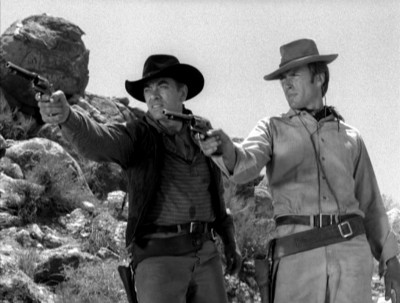
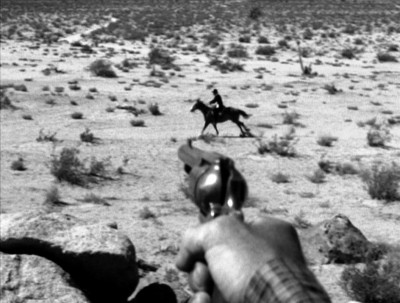
Brush War at Buford, from Mort R. Lewis, is another tough, thematically complicated outing where Cattlemen Association president Robert Middleton is in cahoots with rustlers who are still fighting the War Between the States. Notch up another excellent performance by a young Tim McIntire as a kid confused by hate, with Richard Carlson and particularly Skip Homeier as "the Wichita Kid" doing good work in this challenging piece. Another season best. Cult director Gerd Oswald keeps the string of excellent episodes rolling with The Trading Post, from John and Ward Hawkins. In their clever script, the Hawkins devise a tense story of phony U.S. Cavalry officer Rory Calhoun stealing Rowdy's beeves. Dick Foran shows up (to good effect), and Calhoun, as usual, is excellent playing a tough charmer who can turn like a rattlesnake. Another season best, as this go-around winds down. And finally, the last Rawhide episode concludes with Crossing at White Feather, scripted by Robert Bloomfield and directed by Richard Whorf. Like so many of the best Westerns, Crossing's story concerns a troubled father/son relationship, with The Rifleman's Johnny Crawford discovering he can no longer live with his drunken bum of a father, Albert Dekker. A mournful little outing, where we get a final peek at Rowdy's own troubled childhood, it's difficult not to feel a little sad when wistful Rowdy, seeing Crawford ride off after Dekker, quietly intones, "He's going home," and Rawhide fades out for the last time.
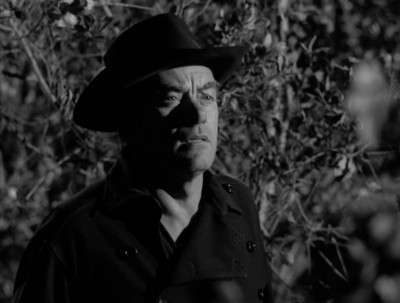
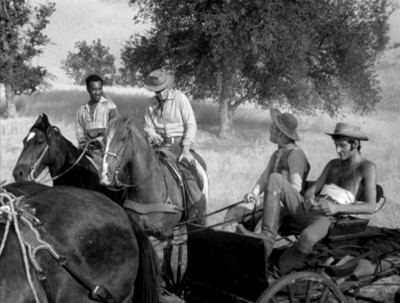
Rawhide went home, too...to Jesus, when CBS Chairman William Paley tuned in one night and saw that Eric Fleming was no longer on the show. Or at least that's how the story goes; there's little doubt, though, with its continual fall in the ratings that Rawhide wouldn't have lasted past this eighth season no matter what Paley saw. Moved yet again, this time to the more advantageous slot of Tuesday nights at 7:30pm, Rawhide's direct competition was the fast-rising now fast-fading Combat! on ABC, and one of the most derided (quite unfairly, I might add) premieres in network sitcom history: My Mother the Car, over on NBC at 7:30pm, followed by bland sitcom under-performer Please Don't Eat the Daisies at 8:00pm. CBS, finally fed up with the long-running oater's numbers, particularly since the network gave it a primo lead-out as a last-ditch effort to save the Western--The Red Skelton Hour, the 4th most-watched show on television that year--Rawhide was unceremoniously cancelled mid-season, and kiddie favorite Daktari premiered in its place...to a remarkable 14th slot in the year-end Nielsen's.
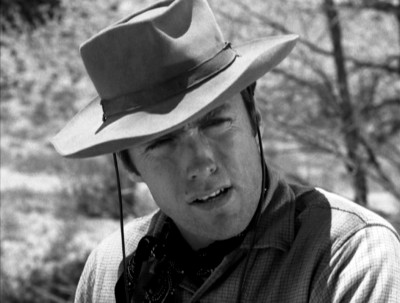
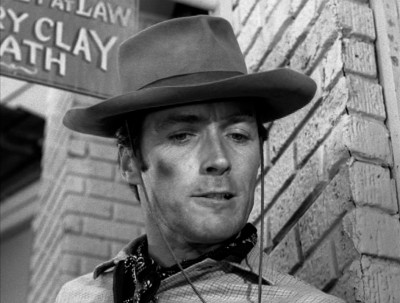
The Video:
The fullscreen, 1.37:1 black and white transfers for Rawhide: The Eighth and Final Season look fine, with generally solid blacks, a sharp image, and few imperfections.
The Audio:
The Dolby Digital English mono audio track is okay, with low hiss and no subtitles or closed captions.
The Extras:
No extras for Rawhide: The Eighth and Final Season.
Final Thoughts:
Final round-up, pards. Rawhide: The Eighth and Final Season sees the series trying half-heartedly to inject some new blood into the now-thoroughly familiar oater. Several of the episodes work quite well this outing, but the producers' efforts to put new characters into the mix was doomed the minute they didn't feel it was necessary for those character to matter to the viewer. So...what was the point? Fans of the series will take this last ride, of course; I'm recommending Rawhide: The Eighth and Final Season.
Paul Mavis is an internationally published movie and television historian, a member of the Online Film Critics Society, and the author of The Espionage Filmography.


|
| Popular Reviews |
| Sponsored Links |
|
|
| Sponsored Links |
|
|
| Release List | Reviews | Shop | Newsletter | Forum | DVD Giveaways | Blu-Ray | Advertise |
|
Copyright 2024 DVDTalk.com All Rights Reserved. Legal Info, Privacy Policy, Terms of Use,
Manage Preferences,
Your Privacy Choices | |||||||









